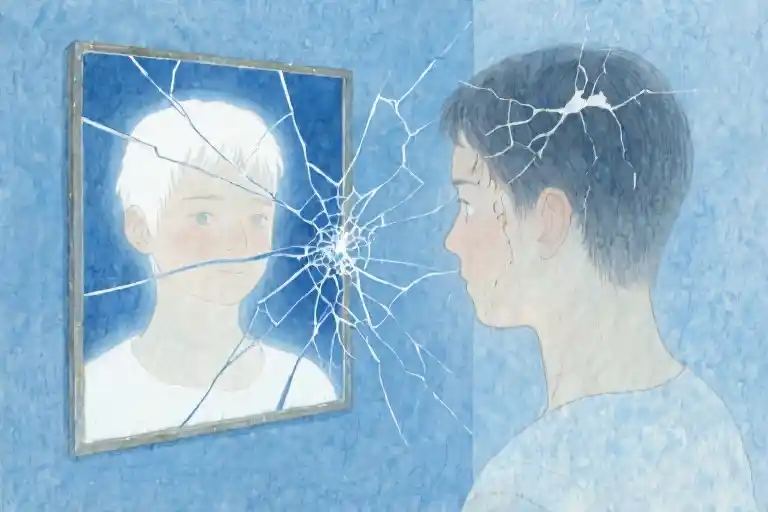Let me tell you why your heartbreak is a lie. That ache in your chest, the sleepless nights replaying conversations, the way you still catch yourself reaching for your phone to text them—none of this is about losing your soulmate. You’re mourning someone who never actually existed.
We’ve all been there. That moment when you realize the person you’ve been crying over wasn’t the real them, but the version you painstakingly constructed in your mind. The one who always said the right thing in your daydreams, who magically overcame all their flaws in your projected future. The hard truth? You didn’t lose your person. You lost your carefully curated illusion.
Relationship experts call this ‘fantasy bonding’—when we substitute the real, messy human being with an idealized mental construct. Your brain, in its desperate attempt to make sense of the pain, has been feeding you edited highlights of your relationship. Like watching a movie trailer and convincing yourself you’ve seen the whole film.
Here’s what nobody tells you about breakup recovery: The withdrawal symptoms aren’t from missing them. They’re from your brain protesting the loss of that addictive fantasy. That story where you were the protagonist in a perfect love story. The narrative where all their inconsistencies were just plot twists leading to your happy ending.
Clinical psychologists have a term for this—’limerence.’ That obsessive state where you’re not actually in love with a person, but with the emotional rollercoaster they provide. The highs of their intermittent affection, the lows of their unavailability. Your nervous system got hooked on the uncertainty, mistaking anxiety for passion.
But here’s the good news buried in this uncomfortable truth: If what you’re grieving was largely imaginary, then you haven’t actually lost what you think you have. The real person—with all their complexities and limitations—still exists somewhere out there, living their separate life. What’s died is just your particular interpretation of them. And interpretations can be rewritten.
This is why traditional breakup advice falls short. Telling someone ‘you’ll find better’ misses the point entirely. The work isn’t about replacing them—it’s about dismantling the faulty belief system that made you think this particular person held the key to your happiness. As psychologist Dr. Alexandra Solomon puts it: ‘We don’t fall in love with people. We fall in love with the stories we create about who they are.’
Your next step isn’t moving on—it’s waking up. From this day forward, start noticing when your mind drifts into fantasy. Those moments when you catch yourself rewriting history, softening their edges, imagining alternate timelines. Each time you do, gently bring yourself back to one grounding question: Did I love them, or the person I believed they could become? The answer will hurt at first. Then it will set you free.
The 10 Signs You’re in Love With a Fantasy
That ache in your chest isn’t heartbreak – it’s withdrawal symptoms from an addiction you didn’t realize you had. We’ve all been there: clutching our phones at 2 AM, scrolling through old texts, convincing ourselves that one magical person held the key to our happiness. But what if I told you the person you’re mourning never actually existed?
The Fantasy Dependency Test
Before we dive in, grab a pen. For each of these signs you recognize, give yourself 1 point:
- You’ve rewritten history
That time they forgot your birthday becomes “they were just stressed” in your mental narrative. Their emotional unavailability gets framed as “mysterious depth.” - Potential trumps reality
You find yourself saying “they could be so amazing if just…” more often than describing what they actually are. - Breadcrumbs feel like banquets
Their occasional “good morning” texts fueled weeks of hope, while their consistent disinterest became “they’re just scared of love.” - Your friends exchange glances
When describing your relationship, people who care about you get that pinched-face look you’ve learned to ignore. - The highlight reel loops endlessly
You replay the 3 perfect dates but fast-forward through the 6 months of confusion that followed. - Flaws become features
Their inability to commit gets labeled as “free-spirited” while your needs get dismissed as “too clingy.” - Future fantasies replace present connection
You’ve mentally decorated apartments together but can’t recall a single deep conversation about values. - You’re the only one doing emotional labor
The relationship exists primarily in your thoughts, analysis, and daydreams – not in their actions. - Red flags look like rainbows
That gut feeling you ignored now has a whole backstory about how “damaged people love harder.” - Alone time terrifies you
The idea of sitting quietly with yourself feels more painful than obsessing over someone unavailable.
Tally Your Truth
- 0-3 points: You’ve got some rose-tinted glasses, but reality still peeks through
- 4-7 points: Fantasy and reality are blurring – time for a clarity check
- 8-10 points: You’re not in a relationship – you’re in a one-person theater production
Here’s what nobody tells you about breakup recovery: The pain isn’t proportional to how good the relationship was, but to how much space your fantasies occupied. That’s why “they weren’t even that great!” logic never helps – you’re not missing them, you’re missing the story you built around them.
Clinical psychologist Dr. Sarah Thompson explains: “Our brains treat romantic fantasies like actual rewards. When we lose them, it triggers the same neural pathways as substance withdrawal.” This isn’t weakness – it’s biology. But unlike chemicals, we can’t detox from fantasies by waiting them out. We have to actively dismantle them.
Tomorrow we’ll explore how to reprogram those neural pathways. For now, just notice: How many of your “memories” were actually hopes dressed up as history?
How Your Brain Betrays You: The Neuroscience of Love Fantasies
That ache in your chest when you think about them? The way your mind keeps replaying those few perfect moments on a loop? It’s not just heartbreak — it’s your brain chemistry playing tricks on you. Understanding this biological hijacking is the first step to breaking free.
The Dopamine Deception
When we romanticize someone, our brain doesn’t just release dopamine — it floods our system with it, creating an addiction more potent than we realize. Neuroscientists have found that the anticipation of reward (those intermittent moments of affection) triggers stronger dopamine responses than the reward itself. This explains why:
- You obsess over texts that might never come
- Brief moments of connection feel euphoric
- The uncertainty makes the craving worse
Dr. Helen Fisher’s research on romantic obsession shows this isn’t poetic exaggeration. MRI scans reveal that rejected lovers show brain activity patterns strikingly similar to cocaine addicts going through withdrawal. Your “missing them” isn’t spiritual — it’s biochemical.
The Fantasy Feedback Loop
Our minds don’t just create fantasies — they reinforce them through:
- Selective Memory (only recalling good moments)
- Confirmation Bias (interpreting neutral events as signs)
- Future Faking (imagining unrealized potential as reality)
This creates what psychologists call a “phantom relationship” — an emotional hologram your mind projects onto an absent partner. The cruel irony? The less contact you have with the real person, the more vivid your mental construct becomes.
Attachment Styles & Projection Tendencies
Your childhood wiring determines how prone you are to this illusion:
- Anxious types idealize partners to soothe abandonment fears
- Avoidants fantasize about unavailable people as emotional safety nets
- Secure attachers recover faster because they see flaws clearly
As attachment expert Dr. Amir Levine notes: “What we call chemistry is often just familiar pain.” That electric connection? It might just be your nervous system recognizing an old wound dressed in new clothes.
Rewiring the Fantasy Circuit
The good news: neuroplasticity means we can retrain our brains. Start with these reality checks:
- The Freeze-Frame Test: When remembering a perfect moment, mentally expand the frame — what was actually happening before/after that second?
- The Boring Truth Journal: Write down three mundane realities about them you intentionally ignored (their bad breath, how they never returned your favorite book)
- The 5-Year Question: Would this person’s unchanged version still fit your life half a decade from now?
This isn’t about cynicism — it’s about recalibrating your perception to see clearly rather than through dopamine-distorted lenses. The real soulmate test isn’t intensity; it’s who remains real when the chemical fog lifts.
The Fantasy Smasher Toolkit
Here’s the uncomfortable truth: Your brain has been running a 24/7 fanfiction series about your ex, and you’re the only reader who didn’t realize it’s fiction. Let’s burn that manuscript together with these three brutal questions that separate romantic delusion from reality.
Question 1: Did I fall for their resume or their daily newspaper?
That “potential” you keep obsessing over? It’s just a LinkedIn profile you mentally wrote for them. The artist who never painted, the writer who never published, the emotionally available partner who never showed up – these were your projections, not their realities.
Exercise: Grab paper. Left column: List 3 “potential” qualities you adored. Right column: Document 3 times they actively contradicted those fantasies. Seeing “He could be so thoughtful” next to “Forgot my birthday twice” creates cognitive dissonance that dissolves illusions.
Question 2: Would I accept this behavior from a friend?
We tolerate romantic red flags we’d never excuse in platonic relationships. That “mysterious” texting pattern? If your best friend treated you that way, you’d call it disrespectful. Their “busy schedule” that prevented basic courtesy? You’d label it neglect in any other context.
Reality check: Rewrite one of your cherished memories as if it happened between friends. That dramatic airport reunion? If your college roommate did that after ghosting you for months, you’d see it as love-bombing, not romance.
Question 3: Am I grieving the person or the role they filled?
Often we miss what someone represented (“my last chance at love”) more than who they actually were. Therapist Esther Perel observes: “The stories we tell about loss are often stories about ourselves.” Your anguish might stem from:
- Losing your identity as “the one who finally changed them”
- Fear of being unlovable without their validation
- Dread of restarting the dating process
Soul-searching: Complete this sentence: “Without them, I’m afraid I’ll never __ again.” The blank often reveals your actual wound.
The Bitter Medicine
This work hurts because you’re not just getting over a person – you’re detoxing from the alternate universe where they were your soulmate. Neuroscience explains why: Your brain registered fantasy and reality as equally true. Those dopamine hits from imagining your future together? They created actual neural pathways indistinguishable from real experiences.
But here’s your power: You authored that fiction, which means you can write a better truth. Start by comparing just one fantasy/reality pair daily. Within a week, the cognitive dissonance will make those rose-tinted memories feel like someone else’s story – because they were.
The 7-Day Reality Check: Rewiring Your Heartbreak
Here’s the hard truth no one tells you about breakup recovery: time doesn’t heal wounds. Conscious, deliberate action does. This isn’t about waiting for the pain to fade – it’s about actively dismantling the fantasy you’ve been clinging to. Consider this your intervention protocol.
Day 1: The Inventory
Start simple but brutal. Open your notes app and list:
- 3 concrete reasons the relationship ended (not “we grew apart” – specifics like “they canceled our anniversary plans for a poker night”)
- 2 traits you actively disliked about them
- 1 time they made you feel small
This isn’t cruelty – it’s cognitive behavioral therapy in action. Your brain has been running highlight reels. We’re restoring the deleted scenes.
Day 2: The Digital Detox
Unfollow. Not just mute. The half-measures are what keep the neural pathways alive. Every time you resist checking their social media, you’re literally rewiring your dopamine system. Yes, it will feel like withdrawal. That’s how you know it’s working.
Day 3: Memory Audit
Pick one “perfect” memory you’ve been romanticizing. Now reconstruct it with journalistic precision:
- What were you actually wearing?
- Were there unresolved tensions that day?
- What happened immediately after that “magical” moment?
You’ll find most core memories are like movie sets – beautiful facades with scaffolding behind them.
Day 4: The Replacement
Your nervous system is craving those love chemicals. Give it a healthier source:
- 45 minutes of cardio (nature’s antidepressant)
- Cold shower (resets your stress response)
- Learning a new physical skill (cooking, dancing – anything that requires focus)
Day 5: The Mirror Work
Stand in front of a mirror for 5 uninterrupted minutes. Say aloud:
“I choose reality over fantasy because I deserve love that doesn’t require imagination.”
The cringe you feel? That’s your ego protesting honesty. Let it.
Day 6: The Timeline
Draw two parallel lines:
- The actual progression of your relationship (first fight, first disappointment)
- The fantasy version you’ve been nursing
The gap between these lines is where your suffering lives.
Day 7: The Upgrade
Write a letter to your future self:
“Thank you for not settling for breadcrumbs when you deserved banquets. Thank you for loving me enough to choose truth.”
Building Real Connections
Now that you’ve cleared the debris, practice these daily:
- When meeting someone new, notice actual behaviors rather than potential
- Share an unpopular opinion early – authenticity repels fantasy-builders
- Schedule weekly friend dates where phones stay in bags
The withdrawal symptoms will pass. What remains is your newfound superpower: the ability to love what exists, not what could be.
The Only Love Story That Matters Now
Here’s the hard truth you’ve been circling around but haven’t quite faced: every minute you spend mourning that imaginary relationship is a minute stolen from your real life. That version of you still clutching at phantom connections? She deserves better. He deserves truth.
We’ve walked through the wreckage together – dissected those carefully constructed fantasies, followed the breadcrumb trail of dopamine-fueled illusions back to their neurological source. Now comes the part where you choose whether to keep living in the fiction or step into something far more courageous: your own unedited reality.
Final instruction: Open your notes app right now (yes, while reading this) and complete these three actions:
- Type today’s date and the words “Day 1 of Reality”
- Write one concrete way the person failed to meet your fantasy (Example: “When I was sick, they sent a meme instead of soup”)
- Add one way you’ll show up for yourself today that they never did (“Buy myself flowers every Tuesday”)
This isn’t about hating them or even getting over them. This is about finally seeing yourself clearly – not as someone’s imaginary soulmate, but as your own living, breathing, messy masterpiece. The love story that continues beyond this page isn’t about who you lost; it’s about who you’ve been waiting to become.
The person you need to fall in love with is the one reading these words. Start with Day 1. Then do it again tomorrow. The fantasy will fade when something real takes its place.





